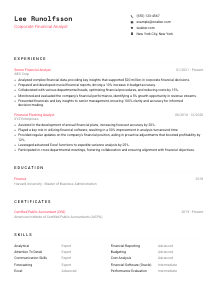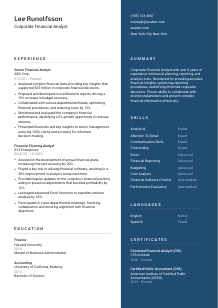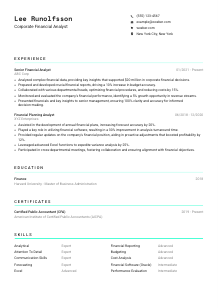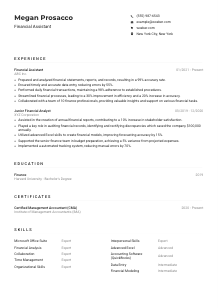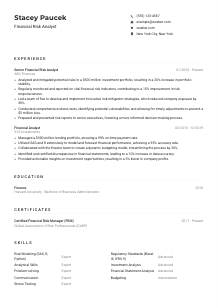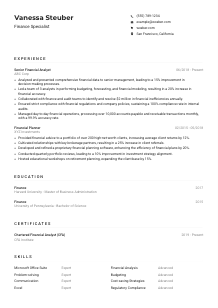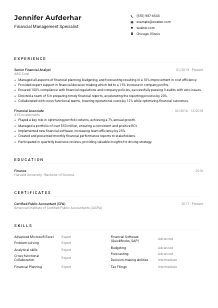Corporate Financial Analyst Resume Example
Delving into fiscal reports, but your resume feels like a bear market? Explore this Corporate Financial Analyst resume example, chiseled with Wozber free resume builder. Learn how to channel your analytical acumen to align with the company's strategic goals, ensuring your career graph stays on the upswing!
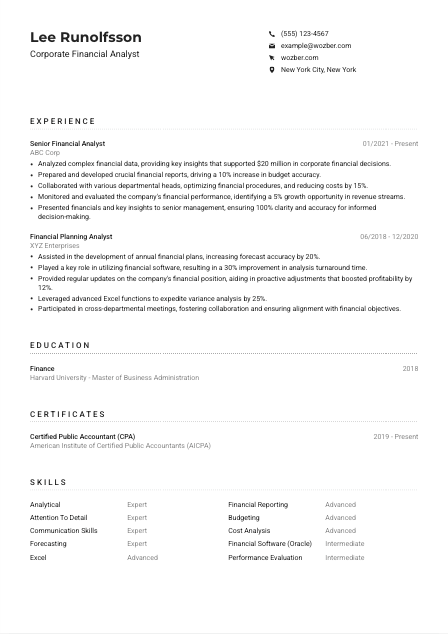
How to write a Corporate Financial Analyst Resume?
Stepping into the realm of Corporate Financial Analyst means diving deep into numbers, forecasts, and financial reports. But before you can showcase your analytical prowess in the boardroom, you need to navigate the first critical step – crafting a resume that not only ticks all the boxes but tells a story of your financial acumen. Using Wozber's free resume builder, this guide unfolds the art of making your resume a beacon for hiring managers, specifically designed for the Corporate Financial Analyst role.
With our tools, including free ATS-friendly resume templates and an ATS resume scanner, you're equipped to create a resume that stands out in a sea of sameness. Let's embark on this journey together, transforming your expertise into an engaging narrative that lands you the job.
Personal Details
The Personal Details section sets the professional tone of your resume, offering a concise snapshot of who you are. It's more than just your name and contact information; it's your first handshake with the hiring manager. Here's how to ensure this section makes a lasting, professional impression for a Corporate Financial Analyst role.
1. The Professional Introduction
Begin with clarity and confidence. Present your name prominently, akin to a brand logo, ensuring it's impossible to overlook. Follow with the job title you're targeting - "Corporate Financial Analyst" - to immediately align your application with the role. This is like setting the stage before the curtain rises, telling the hiring manager precisely what they can expect.
2. Contact Information Essentials
Next is ensuring your contact information leaves no room for error. Your phone number and a professional email address (think firstname.lastname@email.com) must be pristine, whispering professionalism. Double-check this; a typo here could mean a missed connection with your future employer.
3. Locale Specifications
Given that location can be a deal-breaker, state "New York City, New York" to echo the job's geographical requirements. This small detail reassures your potential employer of your feasibility for the role, subtly ticking another requirement off their list.
4. Digital Presence
If you have a LinkedIn profile or a personal website that showcases your professional journey or portfolio, include it. Make sure these platforms reflect the same level of professionalism and mirror the details of your resume. This digital footprint can significantly elevate your first impression.
5. Privacy Matters
It's important to respect your privacy. Avoid including details like your age, gender, or photo unless they are explicitly requested (which is rare in most professional scenarios) to ensure the focus remains on your capabilities and experience.
Takeaway
Crafting the Personal Details section of your resume isn't merely about listing contact information; it's about initiating a professional dialogue. It's your first opportunity to communicate efficiency and attention to detail, resonating with the discipline expected of a Corporate Financial Analyst.





Experience
In the foundation of any great resume, especially for a Corporate Financial Analyst, lies the Experience section. It's here where your past roles illuminate your future potential. Let's walk through transforming your professional background into an enticing narrative that speaks volumes to hiring managers.
- Analyzed complex financial data, providing key insights that supported $20 million in corporate financial decisions.
- Prepared and developed crucial financial reports, driving a 10% increase in budget accuracy.
- Collaborated with various departmental heads, optimizing financial procedures, and reducing costs by 15%.
- Monitored and evaluated the company's financial performance, identifying a 5% growth opportunity in revenue streams.
- Presented financials and key insights to senior management, ensuring 100% clarity and accuracy for informed decision‑making.
- Assisted in the development of annual financial plans, increasing forecast accuracy by 20%.
- Played a key role in utilizing financial software, resulting in a 30% improvement in analysis turnaround time.
- Provided regular updates on the company's financial position, aiding in proactive adjustments that boosted profitability by 12%.
- Leveraged advanced Excel functions to expedite variance analysis by 25%.
- Participated in cross‑departmental meetings, fostering collaboration and ensuring alignment with financial objectives.
1. Dissecting Job Requirements
Start by scrutinizing the job description. Note the responsibilities and achievements that mirror the tasks of a Corporate Financial Analyst, such as "analyzing complex financial data" and "presenting financials to senior management." This reflection ensures you showcase relevant, transferable experience.
2. Your Professional Saga
Organize your roles in a reverse-chronological order, each accompanied by your title, the company's name, and your tenure. This paints a timeline of your evolving expertise, setting a stage to delve deeper into your accomplishments within each role.
3. Achievement Highlights
For each position, draft accomplishment statements that match the job requirements. Quantify your successes with metrics, such as "optimized financial procedures, reducing costs by 15%" or "increased budget accuracy by 10%." This not only shows your proficiency but demonstrates the tangible impact of your work.
4. Numbers Speak Louder
Being in finance, you understand the power of numbers. Use this to your advantage by quantifying your contributions in previous roles. Phrases like "supported $20 million in corporate financial decisions" offer a compelling, quantitative measure of your impact.
5. Relevance is Key
While it's tempting to list every achievement, focus on those directly relevant to being a Corporate Financial Analyst. Sort through your experiences and highlight those that align best with the role's responsibilities and requirements, ensuring each point strengthens your candidacy.
Takeaway
Your Experience section is a testament to your journey in the financial sector. It's where you prove, through concrete examples and quantifiable achievements, that you are not merely a participant but a driver of financial success. Aim to leave the hiring manager with no doubt about your qualifications and potential as a Corporate Financial Analyst.
Education
The Education section of your resume is straightforward, yet, with the right strategy, it can further underline your suitability for the Corporate Financial Analyst role. Here's how to tailor this section to reflect a solid foundation for the job's requirements.
1. Essential Degree Requirements
Start by accurately reflecting the essential qualifications. For instance, the job description prioritizes a "Bachelor's degree in Finance, Accounting, or a related field." Ensure your education aligns perfectly with this prerequisite to immediately signal your eligibility.
2. Structuring Perfection
Maintain a simple yet effective structure in your education entries: state your degree, the field of study, followed by the institution's name, and your year of graduation. This clarity guides the hiring manager through your academic journey with ease.
3. Degree Alignment
In the case of holding a higher degree, like a Master's in Business Administration with a specialty in Finance, make sure it's prominently featured. This not only meets the job's education requirement but elevates your candidacy with advanced coursework relevant to the Corporate Financial Analyst role.
4. Relevant Coursework & Achievements
If applicable, mention courses directly relevant to financial analysis, reporting, or any specialized area pertinent to the job description. Highlight any academic achievements or honors that emphasize your dedication to your field and analytical capabilities.
5. Continuous Education
Should you have participated in financial workshops or seminars that enhance your candidacy, include these as well. Continuous learning showcases your commitment to staying abreast of industry trends and financial strategies, crucial for a Corporate Financial Analyst.
Takeaway
Your educational background should not only fulfill the basic requirements but also demonstrate your commitment to excellence in your field. It's a section that reassures hiring managers of your solid foundation in finance and your potential to grow within the role of a Corporate Financial Analyst.
Certificates
In the world of finance, certifications can significantly bolster your credentials. They serve as proof of your dedication and proficiency in essential skills and knowledge areas. For the Corporate Financial Analyst role, let's explore how to present your certificates effectively.
1. Refer Back to the Job Post
Recall the job description's nod to a "Certified Public Accountant (CPA) designation preferred." If you hold this or any other relevant certification, such as a Chartered Financial Analyst (CFA), ensure these are prominently listed to catch immediate attention.
2. Prioritize Pertinence
When listing certifications, relevance is key. Focus on those directly aligned with the responsibilities of a Corporate Financial Analyst. This ensures that every piece of information presents you as a strong, fitting candidate for the role.
3. Up-to-Date Information
Accuracy is critical. For certifications with validity periods, including the dates showcases not just your achievement but also your commitment to maintaining these credentials up-to-date, reflecting your dedication to professional excellence.
4. Stay Proactive
The financial world is ever-evolving, and so should your knowledge base. Highlighting recent certifications or ones you're pursuing conveys an eagerness to grow and adapt, traits invaluable in a Corporate Financial Analyst.
Takeaway
This section is your chance to shine by showcasing certifications that enhance your resume's strength. It tells the hiring manager that you're not only qualified but also zealous about staying on top of industry standards and developments. It's a robust way to underscore your dedication and expertise in financial analysis.
Skills
The Skills section of your resume is where you get to brag a bit about what you can bring to the table. For a Corporate Financial Analyst, this section is critical to showcase both your hard and soft skills aligned with the job demands. Let's delve into how to make this section work hard for you.
1. Unpack the Job Description
Thoroughly review the job description and list skills that are explicitly required, such as "Analytical," "Attention To Detail," and "Excel." But don't stop there. Incorporate skills that are implied by the responsibilities, like "communication skills" to present complex financial information.
2. Match & Showcase
Now, align your skills with those sought by the employer. Prioritize them in a way that draws immediate attention to your strongest suits, particularly those that directly respond to the job's key requirements. This makes your candidacy not just relevant but compelling.
3. Neatness & Organization
While it's tempting to list every skill you deem important, a cluttered skills section can dilute the impact. Focus on the most relevant, making sure they're clearly listed and easy to comprehend at a glance. This ensures your strongest assets are not lost in the noise.
Takeaway
A well-curated Skills section tells your potential employer that you possess both the technical and soft skills necessary to excel as a Corporate Financial Analyst. It's your opportunity to underscore your adaptability, analytical prowess, and detail-oriented nature, making you an asset to their team.
Languages
In a global business environment, the ability to communicate in multiple languages can set you apart. For a Corporate Financial Analyst, this might not always be a primary requirement, but showcasing linguistic abilities can hint at your potential for broader communications.
1. Job Requirements Check
Begin by identifying if the job posting specifies any language requirements. For a Corporate Financial Analyst role focusing on English-speaking markets, proficiency in English is a given. List it prominently as your primary language, ensuring you meet the basic communication criterion.
2. Highlight Additional Languages
Next, list any additional languages you are proficient in. This not only shows a broader communicative reach but can also hint at an ability to contribute in diverse teams or engage with international markets, should the need arise.
3. Be Honest and Clear
When listing languages, be truthful about your level of proficiency. Use terms like "Native," "Fluent," "Intermediate," or "Basic" to describe your skill level, providing a clear and honest picture of your capabilities.
4. Role & Linguistic Skills
Consider the role and determine how your language skills might add value. For a Corporate Financial Analyst position, the ability to navigate financial reports in different languages or communicate findings to a diverse team could be advantageous.
5. Language as a Unique Asset
Even if the job doesn't explicitly demand multilingual skills, consider this section an additional way to showcase your unique abilities. It paints a picture of a well-rounded individual who's prepared to engage in a globalized business context.
Takeaway
Your language skills offer a glimpse into your capability to traverse in a global marketplace. For a Corporate Financial Analyst, while it might not be the core requirement, it certainly adds a layer of versatility to your resume, presenting you as a candidate with diverse communicative strengths.
Summary
The Summary section is your resume's headline act, concisely capturing your essence as a Corporate Financial Analyst. It's your moment to distill your experience, skills, and accomplishments into a compelling narrative that grabs attention. Let's craft a summary that makes you unforgettable.
1. Job Narrative
Absorb the job's essence from the description and reflect on how your journey aligns with these needs. Start your summary with a strong statement about your professional identity, bundled with years of experience, to establish your baseline qualification.
2. Highlight Your Expertise
Dive into a brief listing of your most relevant skills and notable accomplishments next. Phrases like "renowned for providing accurate financial insights" and "optimized reporting procedures" underscore your expertise and direct impact in previous roles.
3. Concision is Key
A great summary is crisp and impactful. Aim for 3-5 punchy lines that encapsulate your qualifications, leaving the reader intrigued and wanting to learn more. It's about giving them the essence of your professional narrative, not the entire story.
4. Tailored & Personal
Ensure your summary speaks directly to the role of a Corporate Financial Analyst. Tailor it to reflect how your specific blend of skills and experiences makes you the ideal candidate, selling not just your abilities but the unique contributions you'd bring to the position.
Takeaway
A well-crafted Summary does more than introduce you; it positions you as the clear choice for the role. It's a finely tuned pitch that encapsulates your expertise in financial analysis, setting the stage for the detailed account of accomplishments and skills that your resume offers. Make it resonate with your professional story and the role at hand.
Embark on Your Corporate Financial Analyst Journey
You're now equipped with the knowledge and tools to craft a resume that makes you stand out as a Corporate Financial Analyst. Armed with Wozber's free resume builder, ATS-friendly resume templates, and ATS resume scanner, you have everything needed to ensure your resume not only reaches the hiring manager's desk but also makes a compelling case for your candidacy. It's time to condense your years of experience, skills, and achievements into a document that speaks volumes. Go ahead, share your unique financial narrative, and step confidently into your next career opportunity.

- Bachelor's degree in Finance, Accounting, or a related field.
- Minimum of 3 years of experience in financial planning, reporting, and analysis roles.
- Proficient in using financial software and advanced Excel functions.
- Strong analytical and quantitative skills, with attention to detail.
- Effective written and verbal communication skills, with the ability to present complex financial information to non-financial stakeholders.
- Certified Public Accountant (CPA) designation preferred.
- Ability to communicate professionally in English is required.
- Must be located in New York City, New York.
- Analyze complex financial data and provide insights to support corporate financial decisions.
- Prepare and assist in the development of financial reports, including forecasting, budgeting, and variance analysis.
- Collaborate with departmental heads to improve financial procedures and identify areas for cost reduction.
- Monitor and evaluate financial performance of the company, including revenue, expenses, and profitability.
- Present financials and key insights in meetings with senior management, ensuring clarity and accuracy.





